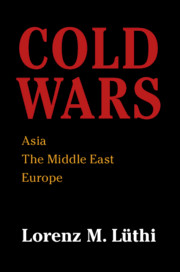Book contents
- Cold Wars
- Cold Wars
- Copyright page
- Dedication
- Contents
- Maps
- Acknowledgments
- Note on Names, Transliterations, and References
- Abbreviations
- Introduction
- 1 From High Imperialism to Cold War Division
- Part I Elusive Unities
- Part II Asia
- Part III The Middle East
- Part IV Alternative World Visions
- Introduction to Chapters 11 to 13
- 11 Asian–African Internationalism
- 12 Non-Alignment
- 13 Pan-Islamism
- Part V Europe between the Superpowers
- Part VI European Détente
- Part VII The End of the Regional Cold Wars
- Notes
- Index
13 - Pan-Islamism
from Part IV - Alternative World Visions
Published online by Cambridge University Press: 19 March 2020
- Cold Wars
- Cold Wars
- Copyright page
- Dedication
- Contents
- Maps
- Acknowledgments
- Note on Names, Transliterations, and References
- Abbreviations
- Introduction
- 1 From High Imperialism to Cold War Division
- Part I Elusive Unities
- Part II Asia
- Part III The Middle East
- Part IV Alternative World Visions
- Introduction to Chapters 11 to 13
- 11 Asian–African Internationalism
- 12 Non-Alignment
- 13 Pan-Islamism
- Part V Europe between the Superpowers
- Part VI European Détente
- Part VII The End of the Regional Cold Wars
- Notes
- Index
Summary
Pan-Islamism was not a unified movement. Different actors promoted pan-Islamist ideas at different times. In the early Cold War, Pakistan promoted pan-Islamism in order to establish and consolidate a separate state as a counterpoint to a Hindu-dominated India. In Egypt, the Muslim Brotherhood promoted pan-Islamist, anti-imperialist, and anti-governmental ideas in the larger region around the British-occupied Suez Canal Zone, while the military regime pursued pan-Islamist ideas to suppress Pakistani pan-Islamism and contain the Muslim Brotherhood. Eventually, the Brotherhood experienced a second birth after the humiliating Arab defeat in the June War in 1967 and a political comeback during the Sadat years in the 1970s. Saudi Arabia launched its own pan-Islamist initiative in the mid 1960s. By the 1970s, it expanded its influence throughout much of the Muslim world by employing its increasing oil income. Finally, during 1970s as well, Iranian pan-Islamism emerged in opposition to and exile from the Shah’s regime. This form of a mainly anti-Western but simultaneously universalist pan-Islamism would become the great antagonist of Saudi pan-Islamism in 1979.
Keywords
- Type
- Chapter
- Information
- Cold WarsAsia, the Middle East, Europe, pp. 307 - 328Publisher: Cambridge University PressPrint publication year: 2020

